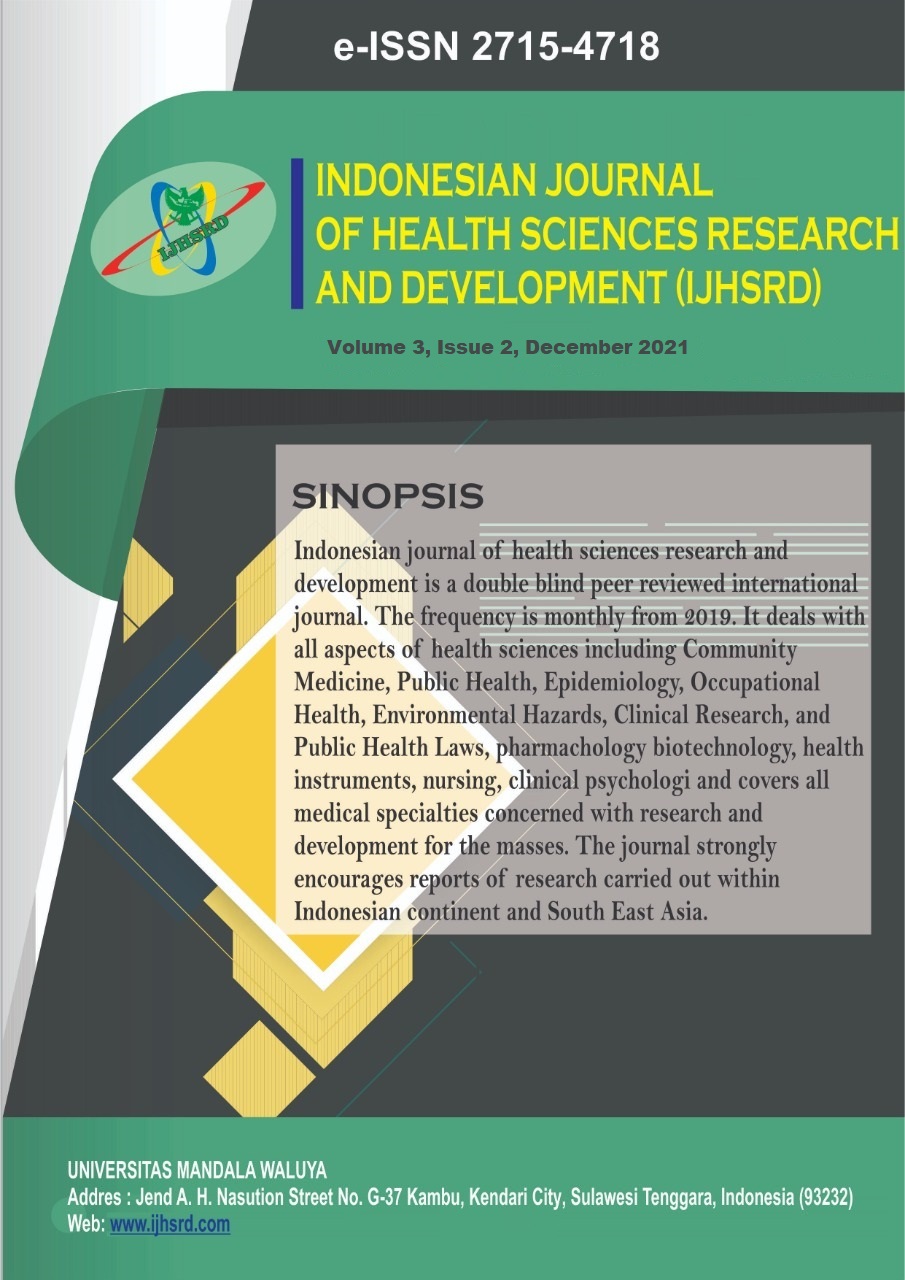Main Article Content
Abstract
Background: The proper management of School Health Units (in Indonesian abbreviation as “UKS”) in educational institutions has the ability to sustain health behavior and optimize student growth and development. As evaluation of the program is a reliable process to measure efficiency and effectiveness of their activities, we aimed to report the evaluation of development the UKS work team and the Three Main Programs of Schools Health Units (TRIAS UKS) in Ngawen Subdistrict, Blora Regency as an indicators’ for Indonesia health research networks and programs.
Methods: This is a quantitative descriptive research with data obtained from principals of 30 Primary Schools by using purposive sampling. The evaluation using the work team form and TRIAS UKS form indicators, including health education, health services and healthy school environments, is designed to profile the development of school health program.
Results: Based on those indicators, the UKS work team still had problems in showing the decree on the organization of UKS team. In terms of health education, many of the schools hd lack of media to promote health. The schools also had difficulties in doing some consultation for mental health for students and some of schools were unsuccessful developing the healthy canteen.
Conclusion: Research evaluation the UKS work team and TRIAS UKS are important elements in the success of the School Health Units (UKS). Thus, it creates constructive positive learning process and provides an overview of the limitations and challenges which can be used for better planning and promotion of the health research system nationally and globally.
Keywords
Article Details

This work is licensed under a Creative Commons Attribution-ShareAlike 4.0 International License.
References
- Notoatmodjo, Soekidjo. 2007. Promosi Kesehatan dan Ilmu Perilaku. Jakarta:Rineka Cipta.
- Kemendikbud RI. 2014. Pedoman Pelaksanaan UKS di Sekolah. Jakarta: Dirjen Pendidikan Dasar RI
- Afandi, Luthfi. 2013. Skripsi: Pelaksanaan Program Usaha Kesehatan Sekolah di Sekolah Dasar Negeri Se-Kecamatan Samigaluh Kabupaten Kulon Progo Tahun 2012.Yogyakarta: FIKUNY
- Glanz K, Rimer BK, Viswanath K, editors. Health behavior and health education: theory, research, and practice. John Wiley & Sons; 2008 Aug 28.
- Freudenberg N, Ruglis J. Peer reviewed: Reframing school dropout as a public health issue. Preventing chronic disease. 2007 Oct;4(4).
- Langford R, Bonell CP, Jones HE, Pouliou T, Murphy SM, Waters E, Komro KA, Gibbs LF, Magnus D, Campbell R. The WHO Health Promoting School framework for improving the health and well‐being of students and their academic achievement. Cochrane database of systematic reviews. 2014(4).
- World Health Organization. Skills for health: skills-based health education including life skills: an important component of a child-friendly/health-promoting school.
- Rochmah KN. Pelaksanaan Usaha Kesehatan Sekolah (UKS) di SD 1 Bantul. BASIC EDUCATION. 2018 Oct 1;7(22):2-142.
- Wane W, Martin G. Education and health services in Uganda: data for results and accountability.
- Nailaufar,Widiya. 2016. Skripsi: Faktor-Faktor Yang Berhubungan Dengan Pelaksanaan Usaha Kesehatan Sekolah (UKS) di Tingkat Sekolah Dasar Willyah Kerja Puskesmas Pamulang Kota Tangerang Selatan. Jakarta: FKIK UIN
- Greenberg MT, Weissberg RP, O'Brien MU, Zins JE, Fredericks L, Resnik H, Elias MJ. Enhancing school-based prevention and youth development through coordinated social, emotional, and academic learning. American psychologist. 2003 Jun;58(6-7):466.
- Konopasek L, Norcini J, Krupat E. Focusing on the formative: building an assessment system aimed at student growth and development. Academic Medicine. 2016 Nov 1;91(11):1492-7.
- Wagner T. The global achievement gap: Why even our best schools don't teach the new survival skills our children need-and what we can do about it. Hachette UK; 2014 Mar 11.
- Sharma M. Theoretical foundations of health education and health promotion. Jones & Bartlett Publishers; 2016 Mar 1.
- Schulz A, Northridge ME. Social determinants of health: implications for environmental health promotion. Health education & behaviour. 2004 Aug;31(4):455-71.
- Fazel M, Hoagwood K, Stephan S, Ford T. Mental health interventions in schools in high-income countries. The Lancet Psychiatry. 2014 Oct 1;1(5):377-87.
- Haleem A, Siddiqui MI, Khan AA. School-based strategies for oral health education of adolescents-a cluster randomized controlled trial. BMC oral health. 2012 Dec;12(1):54.
- Van Ansem WJ, van Lenthe FJ, Schrijvers CT, Rodenburg G, van de Mheen D. Socio-economic inequalities in children's snack consumption and sugar-sweetened beverage consumption: the contribution of home environmental factors. British Journal of Nutrition. 2014 Aug;112(3):467-76.
